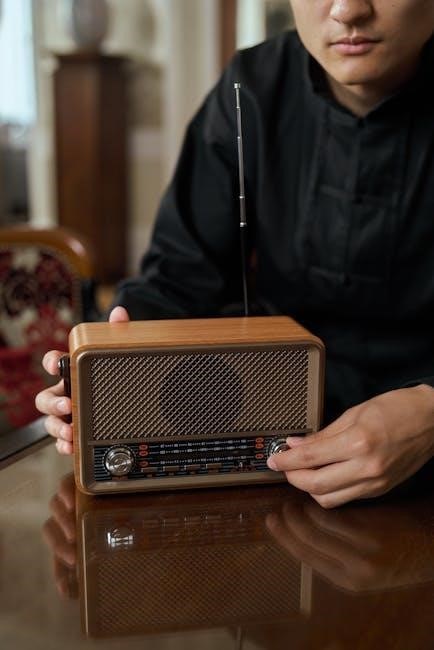Amateur radio licensing is essential for operating radios legally, ensuring safe and responsible communication. The ARRL Ham Radio License Manual and other study guides provide comprehensive resources to help you understand regulations, technical concepts, and best practices, making it easier to prepare for exams and obtain your license.
What is Amateur Radio?
Amateur radio, often called “ham radio,” is a global hobby and service that allows individuals to communicate locally and worldwide using radio waves. It fosters technical learning, emergency communication skills, and social interaction. Amateur radio operators use designated frequency bands to transmit voice, text, and data, adhering to strict regulations. The hobby encourages experimentation with radio technology and provides a platform for public service during disasters. To operate, one must obtain a license, which ensures responsible use of the spectrum. Resources like the ARRL Ham Radio License Manual and study guides simplify the learning process, making amateur radio accessible to everyone interested in this rewarding field.

Why Do You Need a License?
A license is required to operate amateur radio equipment legally, ensuring responsible use of the radio spectrum. It verifies that operators understand technical and regulatory aspects to avoid interference with other communications. The FCC mandates licensing to maintain order and safety in radio operations. Licenses are issued in classes (Technician, General, Amateur Extra), with each requiring a proficiency exam. The ARRL Ham Radio License Manual and other study guides provide detailed information to help prepare for these exams. Licensing also grants access to specific frequency bands, enabling communication locally and globally. It fosters a community of skilled operators who contribute to public service and emergency communication efforts.

Understanding the Amateur Radio License Classes
The amateur radio license classes (Technician, General, Amateur Extra) are designed to progressively test knowledge and skills. Each class grants access to specific frequency privileges.
Technician Class License
The Technician Class License is the entry-level certification for amateur radio operators, requiring passage of a 35-question FCC exam. It covers basic regulations, safety, and electronics. Key topics include radio theory, antennas, and operating practices. Study resources like the ARRL Ham Radio License Manual and the No-Nonsense Technician-Class License Study Guide simplify preparation. This license grants access to VHF and UHF frequencies, ideal for local communication and emergency response. It is the first step toward more advanced licenses, making it a popular choice for newcomers. Earning the Technician Class License opens the door to the world of amateur radio, offering both practical applications and recreational opportunities for operators of all skill levels.
General Class License
The General Class License is the intermediate level of amateur radio certification, requiring a 35-question FCC exam. It builds on the Technician License, covering advanced topics like RF circuit design, antennas, and operating practices. Study materials such as the ARRL Ham Radio License Manual and the No-Nonsense General-Class License Study Guide provide detailed explanations and practice questions. This license grants access to a wider range of frequencies, including HF bands, enabling global communication. Earning the General Class License enhances operational privileges, making it ideal for those seeking to explore advanced amateur radio capabilities. It is a significant step toward mastering amateur radio operations and expanding communication opportunities worldwide.
Amateur Extra Class License
The Amateur Extra Class License is the highest level of amateur radio certification, requiring a 50-question FCC exam. It covers advanced topics such as RF principles, circuit design, and regulatory concepts. The ARRL Ham Radio License Manual and supplementary study guides provide detailed explanations and practice questions to master these subjects. Earning this license grants full operating privileges, including access to all amateur radio frequencies. It is designed for those seeking to deepen their technical knowledge and expertise in radio communication. The Amateur Extra Class License is a challenging yet rewarding achievement, demonstrating a commitment to advancing amateur radio skills and understanding.

Study Guides and Resources
The ARRL Ham Radio License Manual is a top resource for exam preparation, covering concepts for Technician, General, and Amateur Extra classes. Free online flashcards and practice tests complement these guides, offering interactive study tools to master exam questions effectively.
ARRL Ham Radio License Manual
The ARRL Ham Radio License Manual is a comprehensive guide designed to help individuals prepare for their amateur radio licensing exams. It is available in multiple editions, with each tailored to specific license classes such as Technician, General, and Amateur Extra. The manual provides in-depth explanations of key concepts, including radio theory, operating practices, and FCC regulations. It also features practice exams, question pools, and study aids to enhance understanding. The 5th edition is particularly popular, offering detailed insights and updates to reflect current exam questions. This resource is widely recommended for both new and experienced operators seeking to obtain or upgrade their licenses.
No-Nonsense Technician-Class License Study Guide
The No-Nonsense Technician-Class License Study Guide is a straightforward and accessible resource for individuals seeking their Technician-Class amateur radio license. Designed to simplify complex concepts, this guide focuses on the essential information needed to pass the FCC exam. It is available in multiple formats, including PDF, Kindle, paperback, and audiobook, catering to different learning preferences. The guide aligns closely with the FCC exam question pool, ensuring comprehensive coverage of topics such as radio theory, operating practices, and safety protocols. By avoiding unnecessary jargon, it makes the material approachable for newcomers. Additionally, it offers practical examples and clear explanations, helping aspiring operators bridge the gap between theory and real-world application. This guide is a valuable tool for anyone aiming to earn their Technician-Class license efficiently and effectively.
Online Flashcards and Practice Tests
Online flashcards and practice tests are invaluable tools for preparing for amateur radio license exams. Platforms like HamStudy.org offer free resources, including interactive flashcards and unlimited practice tests, to help you master the material. These tools are designed to simulate actual exam conditions, allowing you to assess your knowledge and identify areas for improvement. Many resources, such as those from SignalStuff, provide detailed explanations for correct and incorrect answers, enhancing your understanding of complex topics. Additionally, some websites offer progress tracking, enabling you to monitor your improvement over time. These digital study aids are particularly useful for visual and hands-on learners, making your study sessions more engaging and effective. They are a complement to traditional study guides, ensuring you are well-prepared for your exam.

Preparing for the Amateur Radio Exams

Effective preparation involves using the amateur radio license manual, structured study guides, and practice tests to master concepts and ensure readiness for the exams.
Exam Structure and Question Pools
The amateur radio license exams are structured to test knowledge of regulations, operating practices, and technical concepts. The Technician Class exam includes 35 questions, while the General Class and Amateur Extra Class exams have 50 questions each. Question pools are publicly available, allowing candidates to study specific topics and practice with sample questions. The ARRL Ham Radio License Manual aligns with these pools, offering detailed explanations and practice tests. Candidates can also use online platforms for flashcards and simulated exams to assess readiness. Understanding the exam structure and question pools is crucial for focused preparation and achieving success. Regular practice helps build confidence and ensures familiarity with the exam format and content.
Study Tips and Best Practices

Effective studying for the amateur radio license exams requires a structured approach. Break down the material into manageable sections, focusing on understanding concepts rather than memorizing answers. Utilize resources like the ARRL Ham Radio License Manual and online flashcards to reinforce learning. Practice with realistic exams to familiarize yourself with the format and timing. Join study groups or find a mentor to clarify doubts and gain practical insights. Regularly review and test yourself to identify weak areas. Focus on active learning, such as building simple circuits or using simulation software, to deepen your understanding. Consistent practice and self-assessment are key to achieving success in your amateur radio license exams.

Additional Resources for Success
Online communities, forums, and local radio clubs provide valuable support and tips for amateur radio enthusiasts. Engage with these resources to enhance your learning and stay connected with fellow operators.

Online Communities and Forums
Online communities and forums are invaluable resources for amateur radio enthusiasts. Platforms like Reddit’s r/amateurradio and QRZ.com offer spaces to connect with experienced operators, share knowledge, and gain insights. These forums often feature study materials, exam tips, and technical advice, helping you navigate the licensing process. Many communities also provide access to practice tests and question pools, which are essential for exam preparation. Engaging with these groups can help you stay motivated and informed, while also building a network of like-minded individuals. Whether you’re a newcomer or upgrading your license, online forums are a great way to enhance your learning experience and stay connected with the amateur radio community.

Local Radio Clubs and Mentorship
Local radio clubs and mentorship programs are excellent resources for aspiring amateur radio operators; Clubs like the N7WAH Wahkiakum Amateur Radio and Mich-A-Con Amateur Radio Club offer structured study classes, hands-on training, and guidance from experienced operators. These groups often provide access to study materials, such as the ARRL Ham Radio License Manual, and organize practice exams to help you prepare. Mentorship programs pair you with licensed operators who can answer questions, share tips, and provide personalized support. Attending club meetings and events allows you to build connections, gain practical insights, and stay motivated throughout your licensing journey. Joining a local club is a great way to learn and grow within the amateur radio community.